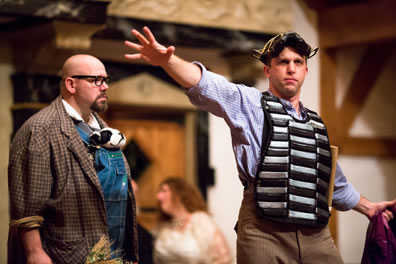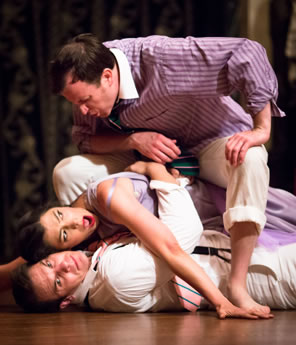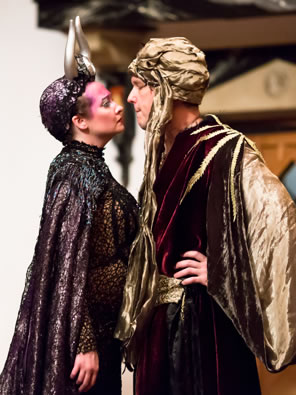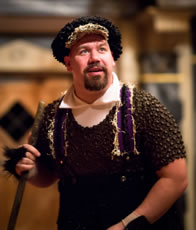A Midsummer Night's Dream
Textual Feelings
American Shakespeare Center, Blackfriars Playhouse, Staunton, Virginia
Friday, September 18, 2015, C–4&5 (front middle stalls)
Directed by Ralph Alan Cohen

Bottom (Gregory Jon Phelps, right) plays Pyramus to the hilt as Starveling (Rick Blunt) playing Moonshine (with his dog) watches in the American Shakespeare Center's production of William Shakespeare's A Midsummer Night's Dream at the Blackfriars Playhouse. Photo by Lindsey Walters, American Shakespeare Center.
You can't wade through the theater lobby. It is jammed and jamming with teen-agers excitedly reliving what they had just experienced. They are re-enacting scenes, mimicking characters, and repeating favorite lines, such as "This dog, my dog." You'd think you had just come out of a Monty Python screening or even a Star Wars movie; instead, you have just come out of a classically rendered production of William Shakespeare's A Midsummer Night's Dream.
This was a Friday night, not a student matinee, so an equal number of adults were hemmed in by the excited rabble of young folk, and that was OK as we—a little less rowdily than the kids—shared our own instant reminisces of the show we'd just seen. It was not just the way Rick Blunt playing Starveling playing Moonshine in the rude mechanicals' presentation of Pyramus and Thisbe defiantly explained to the stupid lords (such did Starveling's expression and tone rate them) that, "All that I have to say, is, to tell you that the lantern is the moon; I, the man in the moon; this thorn-bush, my thorn-bush; and this dog, my dog." It was also the way Blunt buried his head in the plush-doll dog a moment later while Quince (René Thornton Jr.) inexplicably circled around at the back of the stage. Corpsing? The lords were laughing because they are supposed to be laughing per the text, but we learned later that at least one was not laughing in character.
Bottom, as Pyramus, had just died, died, died, died, died. It's a death scene that outdies any opera death, any melodrama death, any cartoon death, any Shakespearean death, and any operatic, melodramatic, cartoonish Shakespearean death you've ever seen. Played by Gregory Jon Phelps as "very tragical mirth," Pyramus's demise is the comic crown of a royally hilarious Dream at the American Shakespeare Center's Blackfriars Playhouse.
A Midsummer Night's Dream is a tricky piece of work. It is to the Shakespeare canon what "Please Please Me" is to the Beatles' songbook, The Adventures of Tom Sawyer is to the Mark Twain library, and The King of Comedy is to the Martin Scorsese filmography, a frothy play with clever thematic strands, scintillating imagery, and just enough serious undertones to make you think even as you laugh. Some directors go overboard with the thematic strands and serious undertones, some directors underappreciate the imagery, and many productions can't whip up an appropriate amount of froth.
This production has everything going for it. At the helm is Ralph Alan Cohen, co-founder and director of mission at the American Shakespeare Center (ASC) and a devotee of Elizabethan original staging practices, which he utilizes in ASC's Blackfriars Playhouse, the world's only reproduction of Shakespeare's indoor theater. Cohen also preaches fealty to Shakespeare's text, emphasizing the play's verse structures and eschewing extratextual conceptualizing. The ASC hires classically trained actors capable of executing these high standards, and the actors in this year's resident company are all established ASC veterans with at least three seasons of work each.
One of the traditional difficulties staging A Midsummer Night's Dream is that Shakespeare created an ensemble play with three equal subsets of characters—the Athenian lovers, the rude mechanicals, and the fairies—and too many productions fail to be equally strong in all three elements. No fear of that happening with this particular ASC company. In fact, most have been in this play. For example, we've seen memorable performances from Thornton doubling as Theseus and cross-gender-casted as Titania; Stephanie Holladay Earl doubling as a leather-clad warrior Hippolyta and an exotic Titania; John Harrell bringing his droll comic senses to Quince; and Blunt as Bottom, a part he was born to play. Well, turns out he was born to play Puck, too, as a gregarious-bordering-on-bully clown and surprisingly nimble fairy, given his size. Holladay Earl exchanges the exotic hotness of Hippolyta/Titania for the nerdy insecurity of Helena. Thornton has matured from the majestic line readings that were so effective in his Theseus and Titania to a character-driven, nuanced performance of Quince as an impassioned theater hobbiest. Harrell is still doing droll comedy better than anybody, but this time he uses it to bring out the pomposity of Oberon, king of the fairies.
Costume Designer Jenny McNee sets Athens in the Roaring Twenties, the men in colorful Gatsby society, three-piece suits, Hermia (Abbi Hawk) as a flapper, Helena styling more conservatively. The rude mechanicals wear the work vests, shirts, pants, and caps of that time, with Snug (Allison Glenzer) sporting barnstormer pilots helmet and goggles. The fairies are from a Silent-Era Hollywoodized India: Oberon looking like Rudolph Valentino's Sheik but in gold tribune turban and black velvet mystic's robe, and Titania (Sarah Fallon) in black netted gown, sparkling black and purple cape, and high-horned crown, her forehead painted rose red. Puck looks like an oversized Elizabethan page with purple suspenders and furry hands and feet, while Titania's attendant fairies resemble children in a rich man's playroom: Patrick Earl's Peaseblossom in a schoolboy suit and carrying a slingshot; James Keegan's Cobweb in a sailor outfit; Holladay Earl's Moth in a girl's fluffy dress; and Glenzer's Mustardseed in a toddler's yellow dress, complete with pantaloons and mobcap.
This being the bare-stage, universally lit Blackfriars, the production uses no scenery or lighting effects (sound effects when the fairy king and queen throw charms at each other or administer spells are accomplished by actors on instruments). Instead, the play's special effects are achieved by Shakespeare's language, especially Titania's description of the state of the Earth caused by her falling out with Oberon over possession of a changeling boy. This explanation comes via a long, often droned (if not cut) speech that Fallon turns into palpable electric currents running through the theater. The script's poetry is especially pronounced in Act One: in Theseus (Keegan) professing his enthusiasm for wedding Hippolyta (Glenzer), in Lysander (Chris Johnston) commiserating with Hawk's Hermia; and in Holladay Earl's Helena complaining about the disloyal Demetrius (Patrick Midgley). However, saying it's especially pronounced in the first act may be a product of hearing the poetry so expertly played for the first time (after seeing 28 stage productions of this play, including two in this theater). By Act Two, it has settled in our ear as a new standard. Emphasizing the text's poetic constructions is not only beautiful to behold, it heightens the comedy, not just of the lovers' brawl and the fairies' antics, but with the rude mechanicals, too, though they speak in prose.

From bottom, Demetrius (Patrick Midgley), Hermia (Abbi Hawk), and Lysander (Chris Johnston) in William Shakespeare's A Midsummer Night's Dream at the Blackfriars Playhouse. Photo by Lindsey Walters, American Shakespeare Center.
Still, A Midsummer Night's Dream provides much opportunity for comic stage business, especially in the physicality of the lovers' brawl in the woods (and here they all end up in their underwear, which is becoming a tiresome tradition) and in the rude mechanicals' rehearsal and presentation of Pyramus and Thisbe. However, Cohen uses character as the foundation for these visual jokes. Holladay Earl's Helena spends much of the woodland scenes wearing only one high-heeled shoe, so just her walking across the stage generates laughs. When Puck's magic puts the four lovers to sleep, Blunt has the audience coach him in selecting the right youth of Athenian weeds to receive the antidote potion. When Quince initially casts Flute as Thisbe and Starveling as Thisbe's mother, he tabs the only two cast members—Patrick Earl and Blunt, respectively—with beards to play the women. When Puck comes upon the rehearsal, he picks up a script and reads it as he walks through the company of acting mechanicals. He's invisible to them, but Glenzer's Snug sees the script floating through the air and is in such conniptions she can't alert the others. When they scatter upon Bottom attaining an ass's head, they move in slow motion (a favorite staging device by this company, but always funny). In the public performance of Pyramus and Thisbe, the two lovers talking through the hole in Wall (played by Snout who is played by Harrell) is given obvious sexual connotations. During the production we attended, one man in the audience departed after this sequence, and Phelps's Bottom naively waved goodbye to him.
Cohen not only lets funny happen in this play, he inserts an antidote to the play's decidedly unfunny aspect, the cruel obstinacy of Hermia's father, Egeus (Thornton) as he demands that she marry Demetrius. "I beg the ancient privilege of Athens," Egeus says: "As she is mine, I may dispose of her, which shall be either to this gentleman [Demetrius] or to her death, according to our law immediately provided in that case." The person on stage most perturbed by this statement is Demetrius himself, Midgley looking with shock at Egeus. It's a bold stroke that comes off only because Midgley turns Demetrius's subsequent lines as an earnest effort to make all right for everybody—not Lysander, perhaps, but this Demetrius truly believes that he's better for Hermia in the long run, though she doesn't think so at the moment. Demetrius as the nice guy? He who threw over his avowed love for Helena when he saw Hermia? Midgley somehow pulls it off, in this opening scene and also as Helena chases him in the woods. His threats toward Lysander and her are false bravado meant to scare her, but she clings to him harder and he looks to the audience pleading for a little help here. He certainly gets our sympathy, and we can even see why he had previously bailed on Helena. Contrarily, when the hitherto sweet Lysander receives the love potion that turns his dotage from Hermia to Helena, Johnson takes the lines he's given—filled with hate and vile insults for Hermia—as a pointer to play the infected Lysander as a slimy jerk.
All are superior performances; and yet Phelps's performance tops them all. Every year I write a review of a production featuring Phelps that says something about how he "has raised his game to the upper echelons of acting and character development." Well, he keeps rising. I've seen too many great Bottoms to count—including Blunt's on this stage—but Phelps's portrayal of Bottom goes beyond keeping the audience in stitches; it cracks up his fellow cast members, too. Phelps has played a number of clowns in this theater (he also has played princes, kings, romantic lovers, and con artists), and he could have gone broad with Bottom and been on sure footing. But in his first scenes he presents a man whose bluster is a product of his own insecurities. It's not merely funny, it's endearingly funny. Upon Bottom's transformation into an ass, Phelps subtly changes his facial expressions to infer donkey-like behavior rather than loudly braying or demonstratively stomping his feet. As Titania makes love to him, he sheds some of his insecurities, though he gives her a bothered "huh?" look when she says she will "purge thy mortal grossness so that thou shalt like an airy spirit go." That purging sounds like it could hurt, Phelps's look says.


Above, Titania (Sarah Fallon) faces off with Oberon (John Harrell) in Shakespeare's A Midsummer Night's Dream at the Blackfriars. Right, Rick Blunt as Puck. Photos by Lindsey Walters, American Shakespeare Center.
It is this newly emboldened man who ends up playing Pyramus before the Duke. Wearing a baseball catcher's mask and chest protector as his armor, Phelps manufacturers much of the humor of this climactic scene in the space between the confident mannerisms he gives to Bottom and the notoriously bad lines and embarrassingly bad acting he's performing. Yet, Phelps is so cognizant of the Blackfriars Playhouse's intimacy and unique audience-actor relationship that he (or, rather, Bottom) takes his cues from audience reaction, resulting in Bottom's playing of Pyramus varying from show to show. Even the best actors—and ASC has some of the best I've seen anywhere—aren't impervious to the singular gems this formula produces.
With a company of 12 actors, doubling is inevitable. However, ASC tends to buck the tradition of doubling Theseus, Hippolyta, and Philostrate (Harrell) with Oberon, Titania, and Puck. In its 2011 production, Theseus doubled with Snug, who plays Lion in Pyramus and Thisbe. Managing this in the final scene was done with some sleight-of-hand stage business. In this production, it is Hippolyta who doubles with Snug while Blunt goes back and forth between Puck and Starveling. The latter creates comic gold as Blunt gives Starveling a hot-headed personality (remember, "my dog"). After Bottom auditions as Lion, Quince claims that such a performance would fright the ladies and "that were enough to hang us all." Harrell's Snout and Earl's Flute follow in unison with "That would hang us, every mother's son" per the text's speech heading of "All." But Blunt's Starveling turns and storms off stage, shouting as he goes, "That would hang us, every mother's son." It's a laugh-inducing exit that allows Blunt time to prep for Puck's spritely entrance at the start of the next scene. Then, as the mechanicals rehearse in the woods, they consider how to get moonshine into the Duke's chamber for their play and determine to see if the moon will be up that night. "Look in the almanac," Bottom says. "Find out moonshine, find out moonshine." Starveling takes this as a direct order and stomps off stage to find out moonshine; not only will Starveling end up playing moonshine, Blunt appears 15 lines later as Puck.
The doubling of Hippolyta and Snug, on the other hand, results in awkward stage business and an unfortunate departure from Shakespeare's text. Before Bottom returns to his friends, cured of his transformation into an ass, Snug reports to the others that instead of one wedding, the Duke and Hippolyta will be joined by two other couples. "If our sport had gone forward, we had all been made men," Snug says, and Glenzer removes her lion paws and walks off in disappointment, allowing the actress time to change into Hippolyta's wedding gown for her entrance a dozen lines hence. At the end of the scene, Thornton's Quince picks up the paws and, with a gleam in his eye, determines to play Lion. However, as he is about to do so in the play, Glenzer's Hippolyta gets up from her seat and crosses to Quince, saying she will play Lion. Hippolyta reads Snug's speech from a script and does her part as Lion, prompting Theseus to commend her as "A very gentle beast." It's a head-shaker of a choice on Cohen's part because it detracts from the scene and violates his own mission to present text-centric Shakespeare. It's not funny, either.
It's even more ironic in the fact that this production shows so well how textual purity (even the Wall hole sequence) practiced by such an expert cast can carry such a well known piece of work as A Midsummer Night's Dream to visionary status. Fortunately, Starveling and his dog and Bottom's death, death, death, death, death scene for Pyramus get the play back on track and coursing to its joyful, four-curtain-call ending. I've always said, trust in Shakespeare for he will never fail you; I've always used ASC productions as evidence. In all its greatness and one misstep, this production of A Midsummer Night's Dream provides the soundest evidence of all. Just watch and listen to those kids in the lobby—and us adults, too.
Eric Minton
October 14, 2015
Comment: e-mail editorial@shakespeareances.com
Start a discussion in the Bardroom



 Find additional Shakespeareances
Find additional Shakespeareances